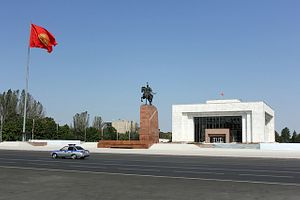On Saturday, the U.S. Embassy in Bishkek posted a message warning of possible terror attacks in Kyrgyzstan in the month of October. The warning — echoed shortly after by a British warning — was short on details, noting that the “U.S. Embassy has received information indicating the possibility of terrorist attacks, which may potentially involve kidnapping and hostage taking, targeted against local authorities and foreign diplomats during the month of October in the Kyrgyz Republic.”
The British Embassy’s warning also urged Brits to “Take care if you travel to the Oblasts (Provinces) of Osh, Batken and Jalal-Abad.”
Both warnings, as is fairly standard, urged citizens to avoid large public gatherings and be cautious around demonstrations or protests. The warnings may be less than they appear to be.
It’s not clear from the U.S. and UK warnings from where the threat emanates. It is worth noting that while the U.S. Embassy in Bishkek issued a “security message” the U.S. State Department does not list Kyrgyzstan among the countries with recent travel warnings or travel alerts. This could be a clerical error, but is more likely a reflection of the relative risk in comparison to other parts of the world.
Nonetheless, the Kyrgyz were certainly interested. The Foreign Ministry, as reported by 24.kg, summoned the U.S. and UK Ambassadors — Sheila Gwaltney and Robin Ord-Smith — to meet with the deputy foreign minister to talk.
The British warning mentioned the August 30 suicide bombing of the Chinese Embassy. There’s no overt connection between the suicide bombing — a first of its kind in Bishkek — and the new alerts, but ongoing investigations and uncertainty cloud the picture.
As EurasiaNet noted in an article last week, the Chinese embassy bombing remains “mired in mystery.” As the article notes, a man named by authorities as financing the attack returned to the country from Istanbul voluntarily, protesting his innocence. I wrote in mid-September:
According to the Kyrgyz authorities, the attack was planned by Syria-based Uighur militants–members of the East Turkestan Islamic Movement (ETIM)–and paid for via a tour company in Istanbul. Five Kyrgyz and Uzbek nations have been arrested in connection to the attack. Last week, according to 24.kg, one of the men named as a suspect distanced himself from the allegations. Mubarak Turganbaev, a Kyrgyz citizen living in Turkey and reportedly wanted by Kyrgyz authorities, wrote on Facebook, “I don’t have anything common with the terrorists.”
Turganbaev, an employee of the Adal tour company, wrote, “Our company operates like a bank.” The company, he wrote, ships cargo between Turkey and Kyrgyzstan and also handles remittances. He wrote that on July 1 a man in Istanbul asked to transfer $5,000 to someone in Bishkek. “He gave me the money, and our employees in Bishkek gave the same amount to the guy named Iskender.” The employees who handed over the money in Bishkek, he wrote, have been arrested.
Turganbaev and two associates are among the 11 people Kyrgyz security services have linked to the attack. As for motive and instruction, based on the target the assumption was that the attack related to Uighur separatism; but Kyrgyz authorities have said that the bomber was “working under the orders of Sirozhiddin Mukhtarov (also known by the nom de guerre Abu Saloh), a Syria-based militant who now seemingly heads a militant group subordinate to the Al-Nusra front.” Mukhtarov, EurasiaNet notes, was identified by the state authorities as Kyrgyz citizen and an ethnic Uighur, despite listing “Uzbek” as his ethnicity on his passport and giving addresses in Uzbek.
Moving beyond figuring out the details of the attack, its effects continue to complicate the lives of those in Kyrgyzstan bound for China. Immediately after the attack, the Chinese Embassy in Bishkek suspended the issuance of visas to Kyrgyz citizens. The Embassy was closed following the attack, it’s unclear when (or if) normal operations resumed. (Anecdotally, on my last night in Bishkek — September 11 — I met a backpacker who was in the mid-hundreds on the list of people seeking visas for China, giving the scope of the Embassy’s backlog regardless of the specific suspension.) Among the most affected, though, are Kyrgyz students with plans to begin, or continue, their studies at Chinese universities this fall. According to a report from a Russian media outlet, Current Time, Kyrgyz students bound for Chinese universities remain stuck in limbo, unable to get visas still.

































